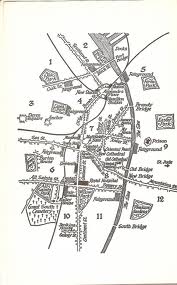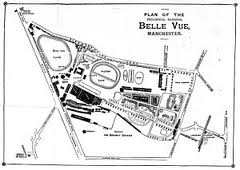The long history of Belle Vue Gardens in Manchester is being celebrated this month, and it seems timely to note its appearance, under the name of Pleasance Gardens, in Michel Butor’s Manchester-inspired 1956 novel L’Emploi du temps (Passing Time).
Butor’s view of Manchester (Bleston in the novel) was, it must be admitted, largely negative. He loathed the climate, and the food, and seems to have been deeply unhappy in the city, where he arrived to take up the post of lecteur in the French department at the University in 1952.
He seems to have taken to Belle Vue, however. Pleasance Gardens, along with the various peripatetic fairs which rotated around the periphery of the city, on the areas of waste land, represent a mobile and open element in a closed, even carceral city, and a window on different kinds of community than those indigenous to Bleston. The narrator sees the friends he knows in a different light in these places, which may be in Bleston but are not fully part of it and don’t share its malaise.
Pleasance Gardens appears on the frontispiece map, in the bottom left-hand corner, its shape not dissimilar to that of the real Belle Vue. Butor took from the real city of Manchester the geography and architecture that interested him and that fitted with his narrative preoccupations, and ignored or altered the rest. The descriptions include a great deal of precision and detail – however, the historians of Belle Vue will have to judge where the fictional version departs from its model.
He describes the entrance to the Gardens:
The monumental entrance-gates whose two square towers, adorned with grimy stucco, are crowned … with two enormous yellow half-moons fixed to lightning conductors, and are joined by two iron rods bearing an inscription in red-painted letters beaded with electric bulbs then gleaming softly pink: ‘Pleasance Gardens’.
The big folding door which is armoured as if to protect a safe, and only opens on great occasions and for important processions, whereas we, the daily crowd, have to make our way in by one of the six wicket-gates on the right (those on the left are for the way out) with their turnstiles and ticket collectors’
The earthenware topped table which displayed, on a larger scale and in greater detail, with fresh colours and crude lettering, that green quarter circle with its apex pointing towards the town centre…
The tickets themselves are described in detail:
the slip of grey cardboard covered with printed lettering: On one side in tall capitals PLEASANCE GARDENS, and then in smaller letters: Valid for one visitor, Sunday, December 2nd. And on the other side: REMEMBER that this garden is intended for recreation, not for disorderly behaviour; please keep your dignity in all circumstances’
On this winter visit:
There was scarcely anybody in the big, cheap restaurants or in the billiard-rooms; avenues, all round, bore black and white arrows directing one to the bear-pit, the stadium, the switch-back, the aviaries, the exit and the monkey-house.
We walked in silence past roundabouts with metal aeroplanes and wooden horses, … and past the station for the miniature railway where three children sat shivering in an open truck waiting to start; and past the lake, which was empty because its concrete bottom was being cleaned’.
Posters everywhere echoed: ‘Come back for the New Year, come and see the fireworks’.
A later visit, in summer, followed one of the fires that feature so frequently in the novel. Belle Vue was devastated by fire in 1958, and whether this account was inspired by a real event I do not know – it may well be that whilst Manchester was plagued by an unusually large number of arson attacks over the period that Butor was there, he extrapolated from that to a fire at Pleasance Gardens, purely for narrative purposes.
In the open air cafe that is set up there in summer in the middle of the zoological section, among the wolves’ and foxes’ cages and the ragged-winged cranes’ enclosure, the duck-ponds and the seals’ basins with their white-painted concrete islands. I could see, above the stationary booths of this mammoth fairground, eerily outlined in the faint luminous haze, the tops of the calcined posts of the Scenic Railway, with a few beams still fixed to them like gibbets or like the branch-stumps that project from the peeled trunks of trees struck by lightning; and I listened to the noise of the demolition-workers’ axes’
If Butor generally warmed to the Gardens, his portrayal of the animals in the Zoo is less enthusiastic – he speaks of the cries of the animals and birds mingling with the noise of demolition, of melancholy zebras and wretched wild beasts, and of their howls during the firework display. Perhaps their imprisonment chimed uncomfortably with his own sense of being trapped in the city.
http://www.manchestereveningnews.co.uk/news/nostalgia/way-were-belle-vue—1209695



#1 by Michael Rowe on March 14, 2014 - 12:03 am
As a denizen of The Rainy City and a youngster there at the time in which the novel was set (being as there was a 29th of February, according to Revel’s diary, it could only have been 1948 or more likely 1952) I consider “Passing Time” to have completely captured the ambience of Manchester, especially the city centre. And not only that, the novel has so many layers that it takes several reads to appreciate what a great literary achievement M Butor pulled off.
After first reading “Passing Time” in the late 1970s, for many years I tried to fathom out, by systematically working backwards and forwards through the novel until I had it structured on a linear basis, what was the ‘something important (that) happened on the 14th February’, which Butor alludes to in the final sentence as the train pulls out of the station, but hasn’t ‘the time’ to write it down in his diary. I never did figure it out – but can cheerfully say “We are quits”.
LikeLike
#2 by cathannabel on March 14, 2014 - 6:47 am
MIchael – many thanks for your reply. It’s great to hear from someone who is as fascinated by this novel as I am (I’ve been studying it for about 8 years now, and am now doing a PhD on it!).
LikeLike
#3 by Michael Rowe on June 7, 2014 - 5:02 pm
Hello again Cathannabel. A friend of mine in USA recently asked me if I could recommend a good read. “Passing Time” sprang to mind and I immediately got back into the obsessional Internet searches for opinions and interpretations of the novel from professional critics to discerning readers. Which brought me here again – was the first time I’d seen your reply. I didn’t want to send my USA friend my dog-eared copy (1965 Jupiter paperback, 7/6 cover price but £4.99p at the time I bought it at W H Smith’s in the early 70s) but apparently the novel is very expensive on Internet sales sites so she hasn’t managed to locate a copy at a reasonable price as yet.
I’m a writer, used to write Nouveau-Proletarian stuff, (have had one novel “Canals and Meaning” and lots of short stories published, plus have written screenplays for indie films and music DVDs. Since I retired after 40 odd years working in shitty factories to subsidise my literary pursuits, the gov is now sponsoring my writing via the old aged pension, so I have started writing in the Nouveau-Pleb genre. Am currently working on a novel set in Chorlton-Cum-Hardy, a suburb on the South side of Manchester, which has an absolutely unique mix of chavs, plebs and yups amongst its denizens, like Passing Time’s Bleston / Manchester, it is the ideal setting for a Nouveau-Pleb novel.
Hope your PhD work is going well. Best wishes to you
LikeLike
#4 by cathannabel on June 7, 2014 - 5:13 pm
I know – I’m thwarted in my attempts to get people to read the book by how hard it is to track down (in English) and how pricey it is… Interesting to hear about your own writing too! All the best – hope the new novel is a success (will keep my eyes peeled for its appearance.) Cheers, Catherine
LikeLike